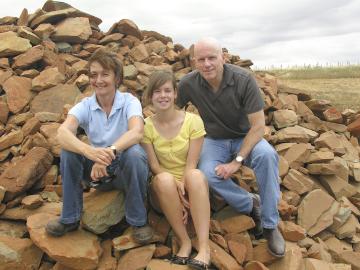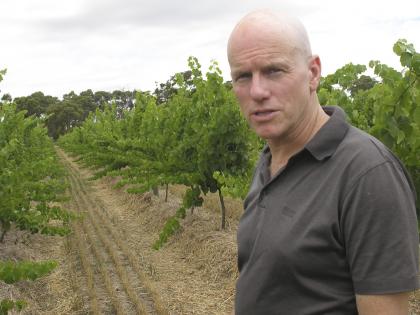Jeffrey Grosset
POSTED ON 01/02/2008Over smoko (Aussie for morning coffee) in the Clare Valley town of Auburn, Jeffrey Grosset is toying with new year’s resolutions with the two women in his life, his partner Stephanie Toole (of Mount Horrocks) and their lively teenage daughter Georgina. Stephanie says she’s been much better lately about not spending every waking moment in the winery. Jeffrey, trying to get his mobile phone to work, says he’s been less successful in that department, joking that they might have to invest in a new BMW to get the free mobile phone.
 Steph, Georgina, Jeff
Steph, Georgina, Jeff
You might not know it from the dolphin-smooth brow and boffin-like appearance (a touch of the Heston Blumenthals) but a wry, ironic tongue always seems to be ever so slightly in the Jeffrey Grosset cheek. The same morning, he’s considering investing in an expensive new state of the art filter. But he’s reluctant to be the first Australian winery to do so, citing his experience as a screwcap pioneer as making him wary of sticking his neck out. ‘What happens to crusaders is that they end up joining a committee’, he says, following his induction for his screwcap pioneering efforts into the wine industry’s technical committee.
Grosset’s diffidence is deceptive, because behind it lies one of Australia’s sharpest winemaking intellects underpinned by a strength of conviction as firm as the bedrock in which his Polish Hill River riesling grows. It’s no coincidence that the ‘boardroom’ (another Grosset in-joke) of the small but stylish winery is the setting for a collection of compelling aboriginal paintings and sculptures. These are no investor’s baubles, but reflect Grosset’s belief in pangkarra, an aboriginal term that has no adequate English translation but, encompassing all the elements of a specific place, reflects ‘the profoundness of cultures like aboriginal culture where they see themselves and the land as one and the same. You are part of the land’.
Jeffrey Grosset is very much part of the land since he established a riesling vineyard in the Polish Hill River area of the Clare Valley in 1981. When it had to be sold, he set up an adjacent vineyard 12 years ago because he’d seen the potential of the slate and shale-based soils for the production of delicate, long-lived, minerally riesling. But his aptitude for crafting fine riesling extends beyond a genius for making it to spirited defence of the variety. When in the late 1980s the big boys of the Australian wine industry proposed to retain the word riesling as a catch-all term (mainly for cask wine irrespective of the variety in the wine), Jeffrey Grosset opposed what he saw as a betrayal. Despite threats to ruin him if he continued with his opposition, he stuck to his guns and the riesling name was duly protected.
 Jeffrey Grosset in Polish Hill Vineyard
Jeffrey Grosset in Polish Hill Vineyard
20 years ago, Grosset planted his triangular, cabernet-based vineyard at 600 metres (‘the average Australian mountain’, he jokes). As a reaction against interventionist viticulture, he called it Gaia in support of the Gaia principle espoused by James Lovelock in the 1980s. Broadly speaking, Lovelock suggested that the complexity of Mother Earth’s (Gaia’s) species gives it the resilience required to withstand change. The Gaia principle led Grosset, ‘notwithstanding the shortcomings of attempting to apply the principles about the world to a tiny vineyard’, to practice sustainable viticulture throughout his Clare Valley vineyards with a minimum of chemicals.
Having influenced Grosset in the original planting of the Gaia vineyard, the Gaia principle inspired him last year to go a stage further by applying all the profits generated from the vineyard to a capital fund invested in high quality, environmentally sustainable businesses. With that end in view, he has established the Grosset Gaia Fund, whose target, in three years, is to provide more than $1mAUD (£435,000) for generating $AUD100,000 (£43,500) annually to support young people, the arts and the environment. Although the response has been broadly positive, scepticism in some quarters has made him typically anxious that the fund might be mistaken for a PR gimmick. ‘I suppose I’m a reticent kind of crusader’, he acknowledges. He needn’t be – reticent, that is.

